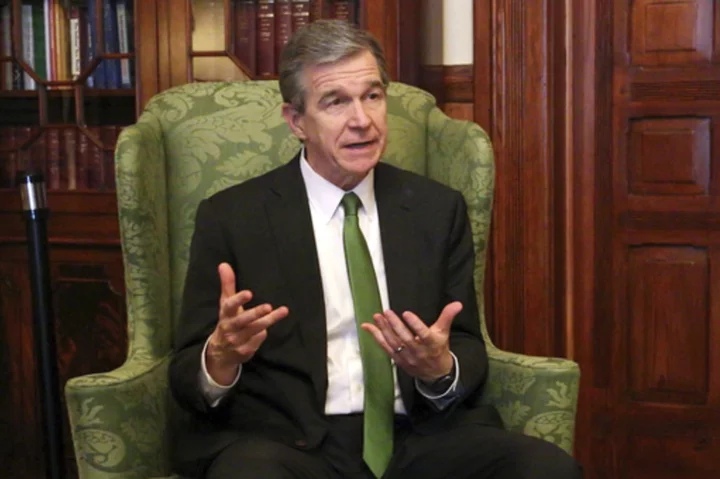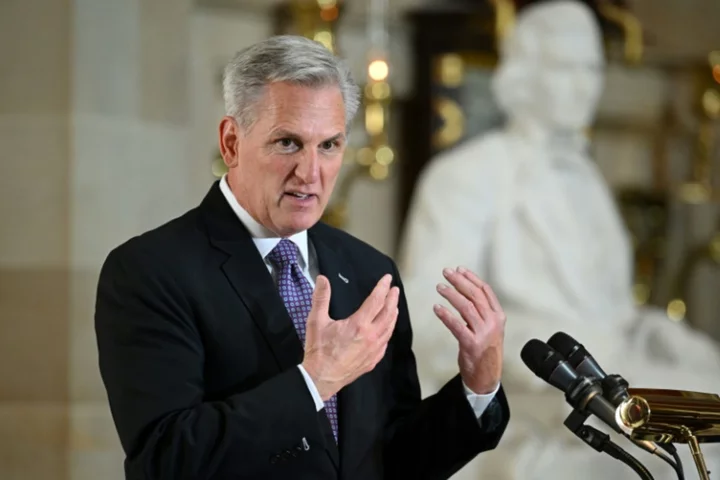RALEIGH, N.C. (AP) — North Carolina's Republican-dominated legislature swept five bills into law Tuesday with veto overrides, placing new limits on wetlands protection rules and barring the promotion of certain beliefs in state government workplaces that some lawmakers likened to critical race theory.
The measures, which also address consumer loans and local government finances, became law after a succession of House votes with margins large enough to overcome Democratic Gov. Roy Cooper's formal vetoed objections earlier this month. The Senate already voted over the past week to override vetoes on each of these bills.
The state constitution deems an override successful if at least three-fifths of the members in each chamber present and voting agree to enact the bill anyway despite the governor's objections.
The overrides exemplify the expanded political muscle of Republicans after electoral seat gains last fall and a House Democrat's party switch in April gave them exact veto-proof majorities in each chamber for the first time since late 2018. Cooper had been able to block several dozen GOP measures over the previous four years with vetoes because there were enough Democrats supporting his efforts.
Several of Tuesday's override votes included support from a few Democrats. Still, Republicans needed to ensure that enough of their party colleagues were in attendance to complete overrides.
Among the bills enacted Tuesday is the legislature's annual farm bill, which contains more than 30 provisions such as penalties for cutting down timber, waiting periods for regulators to inspect veterinarians' offices and the establishment of an official “Farmers Appreciation Day” in November.
Cooper's farm bill veto came Friday. He said the measure would weaken the regulation of wetlands that help control flooding and pollution. His administration and environmental groups have said the bill's language, when combined with a recent U.S. Supreme Court decision, would leave about half of the state’s wetlands unprotected.
Republicans and their allies blunted the impact of the bill's language on wetlands, saying it would affect largely affect isolated terrain that rarely floods and align standards with federal law.
Another now-enacted law that takes effect in December bans trainers of state employees from advancing concepts to workers such as that “one race or sex is inherently superior to another race or sex,” or to believe they should feel guilty for past actions committed by people of the same race or sex. It also would prohibit hiring managers for state agencies, community colleges and the University of North Carolina system from compelling applicants for policy-making jobs to reveal their personal or political beliefs as a condition of employment.
In his veto message, Cooper said the bill attempts to suppress workplace discussions related to diversity, equity and inclusion that can reveal “unconscious bias we all bring to our work and our communities.” But supports of the bill said it actually encourages a diverse set of beliefs within public agencies.
Other bills enacted over Cooper's vetoes in part would raise interest rates and late fees on certain amounts of personal consumer finance loans as well as on consumer credit sales, such as when someone buys a car and pays for it in installments or with a finance charge. Cooper said the higher costs, which would take effect in October on new, renewed or modified loans, would harm residents who already are faced with rising costs of living.
Another vetoed bill would permit the state’s Local Government Commission to order withheld a portion of sales tax revenues the state collects for cities and counties that fail to complete annual audits of their accounts. Bill supporters said the measure will promote government accountability. Cooper said it was well-intentioned but would likely hurt the state’s smallest communities.
The House also voted Tuesday to override another veto of a measure that would restrict some state government activities from being directed based on environmental or social justice concerns. But that bill still must be acted again on by the Senate to become law over Cooper's objections.









